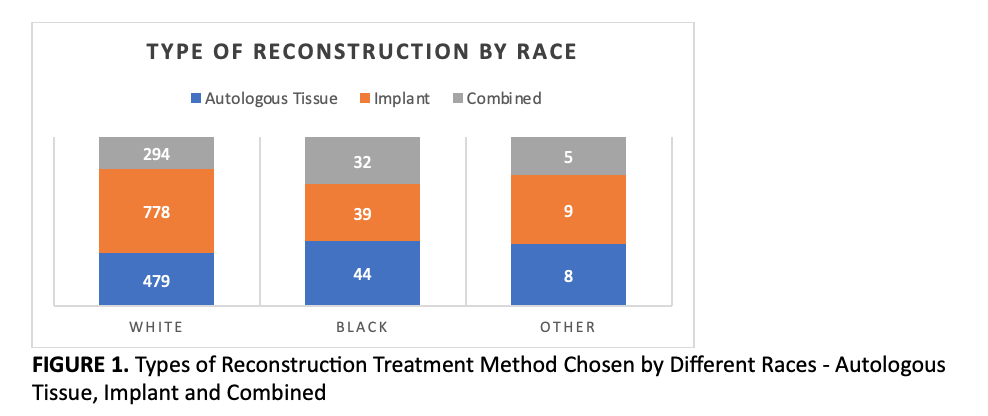Examining Treatment Choices: Addressing Disparities in Breast Reconstruction
Nicole Eregha*, Yadira Villalvazo, Colette B. Gazonas, Carolyn De La Cruz
Plastic Surgery Department, University of Pittsburgh, Pittsburgh, PA
Breast cancer continues to be a prevalent form of cancer among women of all races and ethnicities. However, disparities in healthcare exist, and it is unclear if race impacts the accessibility to various reconstruction methods. Our study aims to explore the influence of race and/or ethnicity on the selection of breast reconstruction methods.
The University of Pittsburgh Medical Center Magee Women's Hospital database was queried from 2011-2022. Women who underwent breast cancer surgery during this time were included in the study, using demographic characteristics such as race, ethnicity, age, histology/behavior, best AJCC stage and reconstruction type.
The study included 13,260 women diagnosed with breast cancer, of whom 1,763 underwent breast reconstructive surgery. Amongst patients who underwent reconstruction, 46.8% had implant reconstruction, 30.1% had autologous reconstruction, and 18.7% had combined reconstruction. Among Black patients, autologous reconstruction was 36.3%, implant reconstruction 32.2%, and combined reconstruction 26.4%. In White patients, autologous reconstruction was 29.5%, implant reconstruction 48%, and combined reconstruction 18.2%. Among other races, autologous reconstruction was 36.3%, implant reconstruction was 40.9%, and combined was 22.7%. Of the patients who had breast reconstruction, 85.2% underwent unilateral mastectomy, and 14.7% of patients had bilateral mastectomy. Among patients who had bilateral mastectomy, 92.3% were White patients, 6.1% were Black patients, 1.5% were of other ethnicities.
The findings of this study may indicate a potential disparity in access to breast reconstruction and reconstruction methods. Autologous reconstruction was prominent amongst Black patients, while implant reconstruction is the highest among White and other races. White patients were found to undergo bilateral mastectomies more often than Black patients. These differences in treatment options warrants a need for further research to explore their underlying causes.
Back to 2023 Abstracts


